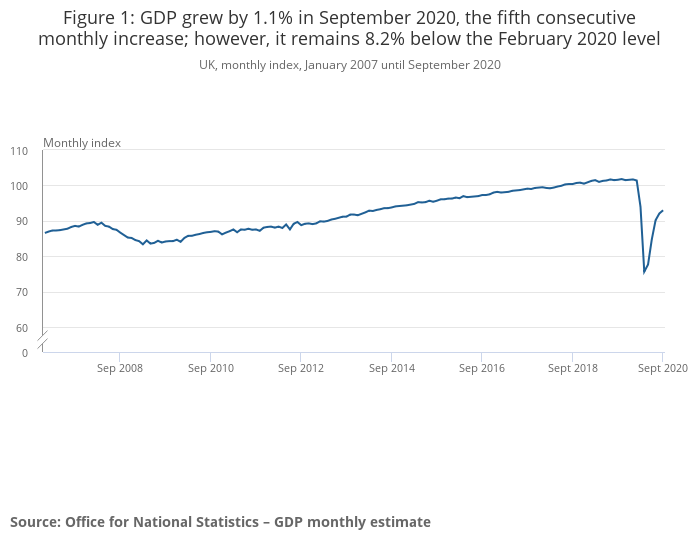UK economy rebounded by 15.5% prior to COVID-19 second wave

The UK economy grew by a record 15.5% between July and September, the Office for National Statistics (ONS) said on Thursday, showing a partial recovery for the UK economy before the second wave of COVID-19 hit.
The ONS said its initial estimate of GDP growth in the third quarter of 2020 was 15.5%. Economists had expected third quarter GDP to grow by 15.8%.
The first estimate showed the UK made progress in reversing the historic economic slump caused by COVID-19 at the start of the year. The third quarter figures was the largest leap in GDP ever recorded by the ONS, stretching back to 1955.
The historic rise reflect the easing of lockdown measures during the quarter and a historic slump in GDP earlier in the year.
Watch: Why can't governments just print more money?
The UK economy shrank by a fifth in the second quarter of 2020, as a strict lockdown in place for most of the period led to collapsing economic activity across the country.
Restrictions were largely lifted by the end of the second quarter and the government encouraged people back to work and into restaurants from summer onwards. That helped lead a bounce back in economic activity.
The ONS said the third quarter bounce back was largely driven by household spending. Business investment remained “much weaker”.
While the headline GDP number was encouraging, Britain’s economy still remains almost 10% below pre-pandemic levels. Growth also slowed throughout the third quarter.
ONS data showed the UK economy grew by just 1.1% in September, marking the fifth monthly deceleration and missing forecasts of 1.5%.

The data underlines the fact that the UK economy was losing momentum even before the imposition of additional restrictions on everyday life. September’s figure compared to GDP growth of 2.1% in August, which itself undershot economists’ forecasts.
“Today’s figures show that our economy was recovering over the Summer, but started to slow going into Autumn,” Chancellor Rishi Sunak said in a statement.
“The steps we’ve had to take since to halt the spread of the virus mean growth has likely slowed further since then.”
The government began introducing increased restrictions to stop the spread of COVID-19, such as curfews, from late September and begun a four week national lockdown on 2 November.
“Although less restrictive than the first, a second lockdown means that output is likely to contract in the fourth quarter,” Suren Thiru, Head of Economics at the British Chambers of Commerce (BCC), said.
“With much of the economy now in a weaker position to withstand periods of extended closure than at the start of the pandemic, the damage to economic activity in the near term may be significant, particularly if restrictions extend beyond 2 December.”
Samuel Tombs, chief UK economist at Pantheon Macroeconomics, forecast GDP would shrink by 0.5% in the final quarter of 2020 and said it was unlikely to recover to September’s levels until next Spring.
The Chancellor said there were “still hard times ahead” but added there were “reasons to be cautiously optimistic on the health side – including promising news on tests and vaccines”.
“My economic priority continues to be jobs – that’s why we extended furlough through to March and I welcome the news today that nearly 20,000 new roles for young people have been created through our Kickstart scheme,” the Chancellor said.
Tombs said this week he did not expect the UK to reach pre-pandemic levels of GDP until at least late 2021 even with the impact of a possible vaccine.
Watch: Bank of England governor’s predictions for the UK economy